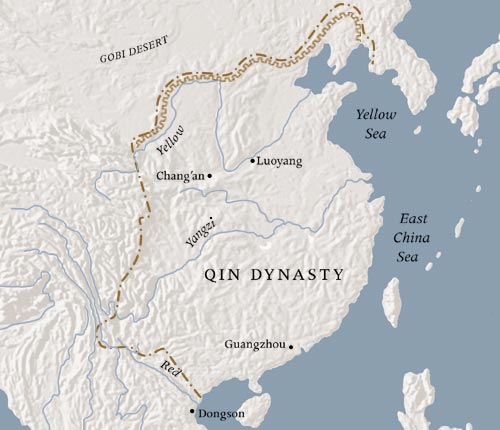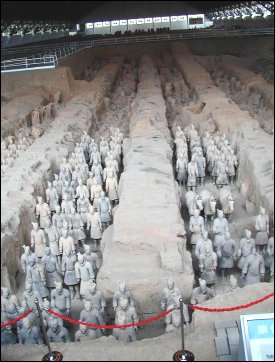
Hist 387_6 Qin Shi huangdi: The First Emperor of China

When King Zheng of Qin unified China, the kings of the last six states he had overcome and their families moved to his capital Xianyang to keep them under control.
The First Emperor standardized weights and measures
of length and volume, created a standardized currency (cash coins) which could
be collected on strings. The width of cart axles was unified as well. Transportation
and travelling was thus considerably simplified. The script was standardized.
Large numbers of people were recruited for public works such as building roads,
linking defense walls to the beginnings of 'The Great Wall', and building the
tomb of the First Emperor. 700,000 men built this eternal palace with its famous
army of thousands of liefesize terracotta soldiers.




The territory was divided in 36 commanderies, (later 42) which were
subdivided into counties.
The state was headed by the emperor, who had a chancellor (head of the buraucracy),
an imperial secretary (drafting the emperor's orders), and the grand commandant
(hed of the military) at his side.
The government of the commanderies was a mirror image of the central government.
The top officials were in charge of tax collecting and population registration
as well as attending to legal matters. He was supervised by an official checking
whether his acitivities followed the law. The military was trained by a commandant.
In 213 BCE a large scale book burning of Classical works is said to have been conducted in the state of Qin, one year later 460 scholars who critisized the emperor's politics are reported by Han historians to have been killed. It is not quite clear whether these reports give the authentic truth.
When the emperor died in 210 BCE the influential eunuch Zhao Gao installed the second son on the throne - against the will of Qin Shi huangdi who wanted his first son to be his successor. After Zhao Gao had killed the chancellor, Li Si, he announced himself to be chancellor and forced the young emperor to commit suicide. When his younger brother came to the throne he brought Zhao Gao's tyrrany to an end and finally surrendered to rebelling troups.